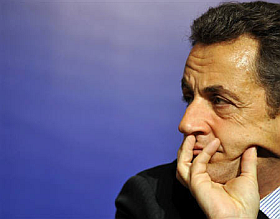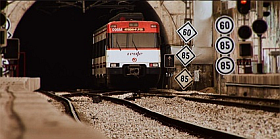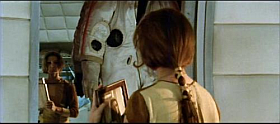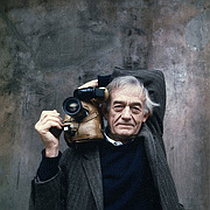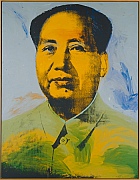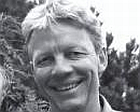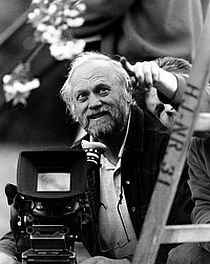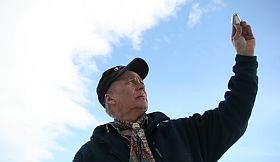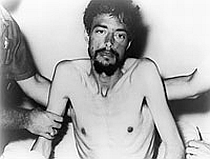De tre billeder i toppen af vores forside er jo fra film, som er vigtige for os. De er fra film, som Tue Steen Müller har valgt ud til 7BEST i Randers i marts: “Deconstruction of an Artist” af Peteris Krilovs, “Life in Loops” af Timo Novotny og “Black Sun” af Gary Tarn.
Deconstruction of an Artist. Af Peteris Krilovs. Gustavs Klucis var en fremtrædende visionær russisk avantgarde kunstner, hvis værker (malerier, fotomontager) er en inspirationskilde for mange den dag i dag. I dette imponerende værk om kunstneren fortolkes hans kunst sideløbende med fortællingen om Stalins propagandist som blev skudt uvist af hvilken grund…
Life in Loops. Af Timo Novotny. En åndeløs, usentimental storbyfilm. En larmende flot musikfilm (Sofa Surfers er bandet) med mennesker i Mexico City, New York, Mumbai, Tokyo mm.
Black Sun. Af Gary Tarn. Maleren Hugues de Montalembert mistede synet i NY ved et grusomt overfald. Komponisten, radiomanden og kameramanden Gary Tarn satte sig for at fortælle og fortolke, hvad den blinde mand ser. En lang fascinerende rejse verden over i selskab med en blændende fortæller med herlig fransk accent.
7BEST FESTIVAL
Tue Steen Müller har her på siden gennem snart halvandet år skrevet om alle de film, han har set – mest på sine mange rejser til seminarer, pitchings, undervisningen på sin italienske filmskole, festivals og en del mere. Og det er blevet til mange omtaler og anmeldelser, de fleste skrevet i tog, fly, cafeer og på hotelværelser. I øjeblikkets begejstrede eller kritiske fart. Og han har kastet de spidse penne efter dem. Nu har han valgt de syv bedste blandt de mange han har set i 2008 og for FOF i Randers tilrettelagt denne lille kræsne festival over en weekend i det tidlige forår. Han vil kort introducere filmene og efter visningen holder han en masterclass for biografpublikum og især for venner af dokumentarfilm, den store, kreative slags.
FILMENE
Citizen Havel. Af Pavel Koutecky og Mira Janek
I 12 år fulgte Koutecky bag kulisserne dissidenten og præsidenten, den karismatisk beskedne og folkekære forfatter, som aldrig blev en almindelig politiker. Det er både gribende og morsomt at være i selskab med dette fine menneske.
http://www.radio.cz/en/article/95815
The Bell. Af Audrius Stonys
En lovprisning af legenderne og den irrationelle fornuft – for eksisterer den, klokken, på bunden af havet, kan den findes, hvem har set den eller hørt om dens forsvinden, spørges der om i denne veloplagte poetiske research-film.
http://arsenals.lv/en/a/2295
Deconstruction of an Artist. Af Peteris Krilovs
Gustavs Klucis var en fremtrædende visionær russisk avantgarde kunstner, hvis værker (malerier, fotomontager) er en inspirationskilde for mange den dag i dag. I dette imponerende værk om kunstneren fortolkes hans kunst sideløbende med fortællingen om Stalins propagandist som blev skudt uvist af hvilken grund…
http://www.latfilma.lv/dd/523/index.html
Life in Loops. Af Timo Novotny
En åndeløs, usentimental storbyfilm. En larmende flot musikfilm (Sofa Surfers er bandet) med mennesker i Mexico City, New York, Mumbai, Tokyo mm.
http://www.lifeinloops.com/
Another Planet. Af Ferenc Moldovanyi
En hjerteskærende historie om fattige og udsatte børn fra fire kontinenter fortalt i et frapperende flot direkte og intimt filmsprog. Instruktøren arbejdede fem år på at lave denne usentimentale appel om at ændre dette helvede på jord.
http://www.another-planet.eu/moldovanyi-uk.html
Blind Loves. Af Juraj Lehotsky
I fire kapitler kærtegner kameraet blinde mennesker i en smuk samling kærlighedshistorier, der er sat i scene med stor respekt og præcis humor, og i samarbejde med de blinde medvirkende.
http://www.blindloves.com/
Black Sun. Af Gary Tarn
Maleren Hugues de Montalembert mistede synet i NY ved et grusomt overfald. Komponisten, radiomanden og kameramanden Gary Tarn satte sig for at fortælle og fortolke, hvad den blinde mand ser. En lang fascinerende rejse verden over i selskab med en blændende fortæller med herlig fransk accent.
http://www.britfilms.com/britishfilms/catalogue/browse/?id=D9CF998213ec523062tKp20CCAD5
Alle filmene har været omtalt på filmkommentaren.dk (search fra forsiden på titlerne)
Alle filmene er med engelske undertekster eller på engelsk
Alle filmene er spillefilm-lange
TID OG STED
Festivalen foregår i Randers på FOF, J.V. Martins Plads 1, 8900 Randers C
Fredag, 13. marts – søndag, 15. marts
OPLYSNINGER OG FORKØB
FOF-Randers: +45 87124040 til@fof-randers.dk http://www.fof-randers.dk/
Her besvares alle spørgsmål om rejsemuligheder, beliggenhed I byen, overnatning mv. og der kan købes kort til hele festivalen eller billetter til de enkelte forestillinger med introduktion og masterclass, i alt ca. 2 ½ time.
Pris: Kort til alle film mv. 350 kr., billet til enkeltforestilling 65 kr.
PROGRAM
Fredag, 13. marts 19:00: Citizen Havel. Af Pavel Koutecky og Mira Janek
Lørdag, 14. marts 11:00: The Bell. Af Audrius Stonys
Lørdag, 14. marts 15:00: Deconstruction of an Artist. Af Peteris Krilovs
Lørdag, 14. marts 19:00: Life in Loops. Af Timo Novotny
Søndag, 15. marts 11:00: Another Planet. Af Ferenc Moldovanyi
Søndag, 15. marts 15:00: Blind Loves. Af Juraj Lehotsky
Søndag, 15. marts 19:00: Black Sun. Af Gary Tarn



